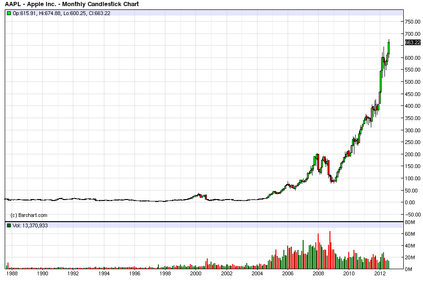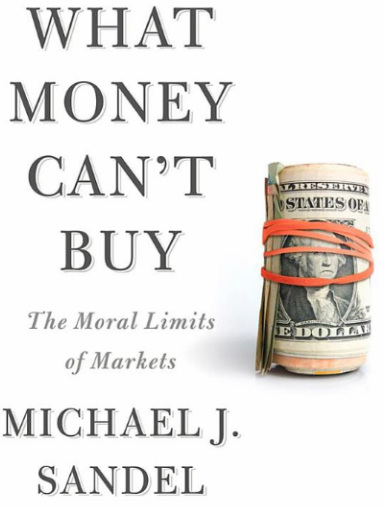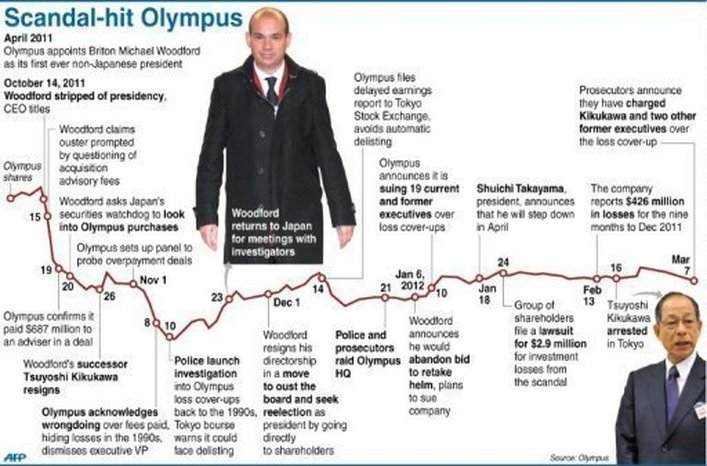International Business Ethics
Does the stock price say it all?

What defines the ultimate success of a corporation? Is it share price or market capitalization (stock price multiplied by total # of shares)? If it is the latter, then Apple is the most successful company of all time with equity approaching $1 trillion (U.S.).
But what if share price doesn't tell us everything? What measures might we use to consider corporate greatness, if we wanted to take into account its positive and negative contributions to global society? (image from barchart.com).
[Note: as of 1/29/2013 Apple shares are trading 36% off of their peak. A staggering $350 billion in market cap has been lost.]
[Note: for the 4th quarter of 2014, Apple record the highest profit ever at $18 billion.]
But what if share price doesn't tell us everything? What measures might we use to consider corporate greatness, if we wanted to take into account its positive and negative contributions to global society? (image from barchart.com).
[Note: as of 1/29/2013 Apple shares are trading 36% off of their peak. A staggering $350 billion in market cap has been lost.]
[Note: for the 4th quarter of 2014, Apple record the highest profit ever at $18 billion.]
Course Description
Gross ethical lapses leading up to and during the recent financial crisis have brought misery to many and have tarnished the image of entire sectors of the global economy. Now more than ever, international business managers must demonstrate that they can be both moral and profitable. Global citizens and corporate leaders must show that they can think beyond the confines of a single culture's ideas about right and wrong with respect to the marketplace. With a concentration on Japan and Asia, this course is designed to broaden a student's perspective on business ethics through consideration of real-world issues and problem solving that any international business manager could face. We will also explore the emerging idea of a global ethical code and examine Japan's role in fostering this idea.
Classroom sessions and assignments are designed to challenge a student's initial perspectives. Important case studies, such as those of famous hedge fund managers and Japanese Internet entrepreneurs, will illustrate the realities and complexities of these issues. As ethics requires being able to establish and defend a position, this course is discussion-intensive and, at times, will require the student to playfully defend ideas that she/he may be personally opposed to.
Gross ethical lapses leading up to and during the recent financial crisis have brought misery to many and have tarnished the image of entire sectors of the global economy. Now more than ever, international business managers must demonstrate that they can be both moral and profitable. Global citizens and corporate leaders must show that they can think beyond the confines of a single culture's ideas about right and wrong with respect to the marketplace. With a concentration on Japan and Asia, this course is designed to broaden a student's perspective on business ethics through consideration of real-world issues and problem solving that any international business manager could face. We will also explore the emerging idea of a global ethical code and examine Japan's role in fostering this idea.
Classroom sessions and assignments are designed to challenge a student's initial perspectives. Important case studies, such as those of famous hedge fund managers and Japanese Internet entrepreneurs, will illustrate the realities and complexities of these issues. As ethics requires being able to establish and defend a position, this course is discussion-intensive and, at times, will require the student to playfully defend ideas that she/he may be personally opposed to.
In reference to businesses and economic recessions,
investor and tycoon Warren Buffett once said:
"After all, you only find out who is swimming naked when the tide goes out (link)."
The 2007-2009 Credit Crisis exposed the Ponzi scheme of fraudster Bernie Madoff, who was likewise arrested in his bathrobe!
(image credit)
investor and tycoon Warren Buffett once said:
"After all, you only find out who is swimming naked when the tide goes out (link)."
The 2007-2009 Credit Crisis exposed the Ponzi scheme of fraudster Bernie Madoff, who was likewise arrested in his bathrobe!
(image credit)
Course Topics
How do we define ethics and business ethics?
Political Ideologies and Business
Socially Responsible Investing
Insider Trading
E-ethics
Spirituality and the Marketplace
Bribery, Corruption, Fraud, and Whistle-blowing
Ethical Codes and Corporate Social Responsibility
____________________________________________________________________________
How do we define ethics and business ethics?
Political Ideologies and Business
Socially Responsible Investing
Insider Trading
E-ethics
Spirituality and the Marketplace
Bribery, Corruption, Fraud, and Whistle-blowing
Ethical Codes and Corporate Social Responsibility
____________________________________________________________________________
In the News/Of Interest
Interesting new research on Amercian CEO compensation. Are the captains of industries really undeserving fatcats? (image credit)
Japanese have come to know and love philosopher Michael Sandel through his intriguing series of filmed lectures on justice at Tokyo University. In his new book, he discusses how society is increasingly embracing markets in every facet of life without question. Far from being anti-capitalist, the book offers a valuable discussion of why we should understand that everything should not have a price in a just society.
The Wisdom of Psychopaths
An exciting new book by Kevin Dutton builds on recent research trends that point to high occurrence of psychopathic traits among business leaders and leaders more generally. I am reminded of a man I met who told me that business ethics comes down to nothing but common sense. However, your boss or employees genetically may lack empathy and may be totally unresponsive to legal or moral consequences. The implications of this work are of great importance and actually help to explain a lot of corporate and political scandals.
An exciting new book by Kevin Dutton builds on recent research trends that point to high occurrence of psychopathic traits among business leaders and leaders more generally. I am reminded of a man I met who told me that business ethics comes down to nothing but common sense. However, your boss or employees genetically may lack empathy and may be totally unresponsive to legal or moral consequences. The implications of this work are of great importance and actually help to explain a lot of corporate and political scandals.
- A great overview of the research by the book's author can be found in a Scientific America article here.
- A decent review by the Guardian is here.
- And an article on psychopathic CEOs (including Walt Disney) is here.
________________________________________________________________
The Interplay of Culture and Business Ethics
Are there ideas from traditional Japanese culture applicable to global business?
Kyosei, defined as "living and working together for the common good," has been embraced ideologically by international corporations, such as Canon. This image comes from a page describing Canon's corporate philosophy in terms of kyosei.
Does "being Japanese" pose fewer or greater moral dilemmas in the marketplace?
Japanese are hardly immune to business scandal. We will explore the case study of large-scale fraud committed by Olympus. (Image credit)
What are the proper boundaries between an employee and an employer?

Would you ever show a perspective employer your Facebook account?
Is it right to fire employees for emailing off-color jokes on the company email? Posting tasteless pictures on SNS?
Should companies be allowed to have strict dress codes for office workers?
Is it reasonable for a company to run a credit background check on potential employees?
Should you be required to respond to emails and telephone calls after business hours, on weekends, or during holidays?
Is there anything wrong with a four-week vacation in the late summer?
(Image credit)
Is it right to fire employees for emailing off-color jokes on the company email? Posting tasteless pictures on SNS?
Should companies be allowed to have strict dress codes for office workers?
Is it reasonable for a company to run a credit background check on potential employees?
Should you be required to respond to emails and telephone calls after business hours, on weekends, or during holidays?
Is there anything wrong with a four-week vacation in the late summer?
(Image credit)
How ethically suspect is it to fail in business and lose the money of your creditors and investors?
Silicon Valley is built on a culture that allows for very high rates of business failure.
It is a successful model for innovation, but is it a moral one? (image credit)
It is a successful model for innovation, but is it a moral one? (image credit)








